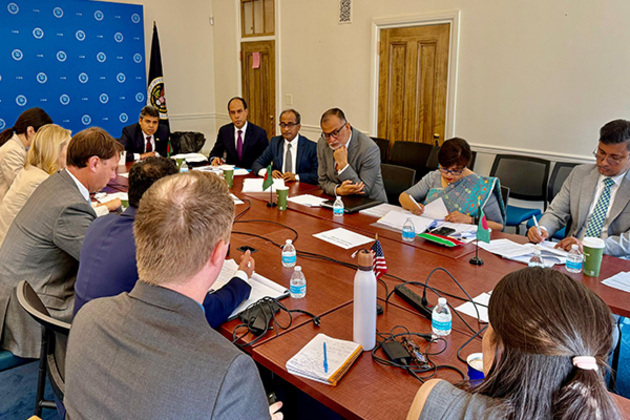5 expert tips to protect yourself from online misinformation
The Conversation
02 Feb 2023, 04:08 GMT+10

The spread of misinformation is a major problem impacting many areas of society from public health, to science and even democracy itself.
But online misinformation is a problem that is very difficult to address. Policing social media is like playing an infinite game of whack-a-mole. Even if we could address one type of misinformation, others quickly spring up in its place. Furthermore, there are valid concerns about how governments and corporations might address this problem and the dangers of censorship.
Talking to experts
We wanted to determine how people could best protect themselves from misinformation online, so in a recent project, funded by the Social Sciences and Humanities Research Council, we created a podcast where we interviewed a group of experts from North America and the UK about misinformation.
We found their answers could be grouped into 5 broad themes.
1) Alter your sharing behaviour and take more time to consider the source of the information, as Philip Mai from Toronto Metropolitan University's Social Media Lab suggests:
Lateral reading can also help people identify the quality of information. Lateral reading involves seeking out additional sources that speak to the trustworthiness of what you're about to share. For example, cognitive psychology professor Stephan Lewandowsky says:
2) Seek out a variety of different news sources and consider paying for access to reputable news sources, if you are in a position to do so, to ensure that accurate news is available when you need it. Timothy Caulfield, Canada Research Chair in Health Law and Policy at the University of Alberta suggests:
It can be difficult to identify quality news sources when there are so many inaccurate ones out there, but there are tools to help. Philosophy scholar Cailin O'Connor, co-author of the book The Misinformation Age, told us:
Prop Watch is an educational non-profit. It provides a catalogue of searchable propaganda that people can access to learn what propaganda looks like so they can better identify it online.
3) Educate yourself and be skeptical of information you encounter. Arming yourself with a critical filter may help protect you against misinformation that you would otherwise accept at face value. Yochai Benkler, faculty co-director of the Berkman Klein Center for Internet and Society at Harvard University, advises:
One way to practice healthy skepticism is to look for power in every story you come across. Journalist and author of the book Spin Doctors, Nora Loreto, suggests asking questions like: "Who has power? Who does not have power? Who's challenging power? How is power being employed? And how is power being protected?."
4) Reconnect with yourself and your communities so you can have better relationships with information and the world around you. We are constantly inundated with information and stimulation in our current attention economy.
As education and technology scholar Shandell Houlden describes, "the attention economy really is a disconnection economy and it disconnects us from ourselves." She suggests that we should pay greater attention to our senses and to how things are trying to make us feel.
Social media platforms and online spaces can leave us disconnected. Reconnecting with our communities can help us combat misinformation by encouraging dialogue with people we disagree with. Communications scholar and artist Geo Takach recommends: "Engage with people, listen even if you disagree with them and try to find common ground based on values."
5) Advocate for systemic change by, for example, electing politicians that care about misinformation, helping people feel less disenfranchised and supporting reliable sources of information. Misinformation is a symptom of much larger systemic issues, ranging from social inequalities to inadequate legal infrastructures. As O'Connor says:
By mobilizing to address the systematic structures that support a healthier information environment, individuals can do more to mitigate misinformation. Overall, it will take action at individual, organizational and systemic levels, but there are meaningful steps we can all take to fight back against misinformation if we have the will to do so.
Authors: Jaigris Hodson - Associate Professor of Interdisciplinary Studies, Royal Roads University | Andrea Galizia - Researcher, JD Candidate, Royal Roads University 
 Share
Share
 Tweet
Tweet
 Share
Share
 Flip
Flip
 Email
Email
Watch latest videos
Subscribe and Follow
Get a daily dose of Illinois Intelligencer news through our daily email, its complimentary and keeps you fully up to date with world and business news as well.
News RELEASES
Publish news of your business, community or sports group, personnel appointments, major event and more by submitting a news release to Illinois Intelligencer.
More InformationNorth America
SectionFedEx, UPS step up as Canada Post loses market share in strikes
OTTAWA, Canada: With Canada Post struggling to maintain operations amid labour unrest, rivals like FedEx and UPS are stepping in to...
US pressuring Africa to accept deportees Nigerian official
Foreign Minister Yusuf Tuggar says his country has enough problems and cant take in foreigners straight out of American prisons Nigeria...
Russian crypto engineer detained in US asks Trump for pardon - advocate
Anatoly Legkodymov is facing extradition to France and 20 years in prison despite already serving one sentence in America ...
Tariff talks between Bangladesh and US end without conclusion
Dhaka [Bangladesh], July 12 (ANI): The three-day second-round tariff talks between Bangladesh and the United States have ended without...
Paul McCartney announces fall 'Got Back' North American Tour; check out dates
Washington, DC [US], July 12 (ANI): The Beatles legend Paul McCartney is hitting the road again. The singer-songwriter has announced...
One pilot asked the other about fuel cutoff seconds before crash, says preliminary AI171 crash report
New Delhi [India], July 12 (ANI): A preliminary investigation into the Air India flight AI171 crash has revealed that just seconds...
International
SectionCDC: US records 1,288 measles cases, most since 1992 outbreak
ATLANTA, Georgia: The United States is facing its worst measles outbreak in more than three decades, with 1,288 confirmed cases so...
Gaza War sucking life out of an Israeli generation
In the past month alone, 23 Israeli soldiers have been killed in Gaza—three more than the number of remaining living hostages held...
Faulty IT system at heart of UK Post Office scandal, says report
LONDON, U.K.: At least 13 people are believed to have taken their own lives as a result of the U.K.'s Post Office scandal, in which...
Travelers can now keep shoes on at TSA checkpoints
WASHINGTON, D.C.: Travelers at U.S. airports will no longer need to remove their shoes during security screenings, Department of Homeland...
Rubio impersonator used AI to reach officials via Signal: cable
WASHINGTON, D.C.: An elaborate impersonation scheme involving artificial intelligence targeted senior U.S. and foreign officials in...
Warsaw responds to migration pressure with new border controls
SLUBICE, Poland: Poland reinstated border controls with Germany and Lithuania on July 7, following Germany's earlier reintroduction...













